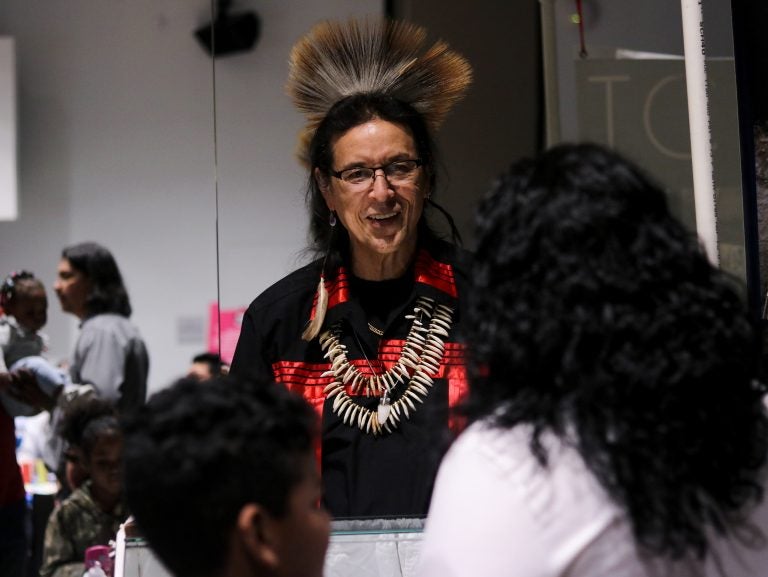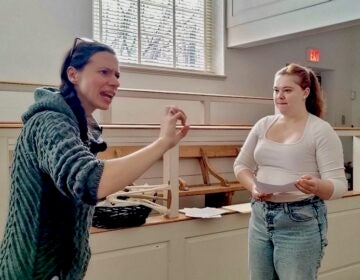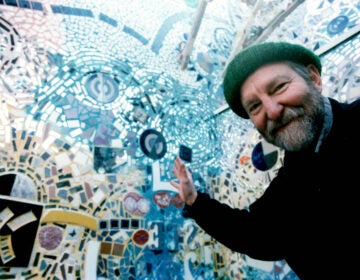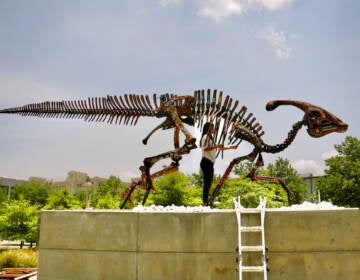Native American artists offer hope and craft in online workshops
We Are The Seeds, based in Philadelphia, is asking Native American artists from around the country to teach digital workshops open to the public.

Tchin, an internationally showcased jewelry maker who lives in New Jersey, speaks with visitors at the We Are the Seeds festival (Angela Gervasi for WHYY)
The artist Tchin will be holding a free, simple drawing workshop this week, teaching people over Zoom the basics of rendering the human face.
In particular, their own faces.
“We’re going to map out the face to explain where your eyes and nose are, so you know where to put things,” he said.
However, drawing your own face is anything but simple. Tchin says paying an unusual amount of attention to a mirror can lead to self-reflection of a different sort.
“I remember one interesting class with some children, young teenagers. This young lady had lost her mother,” said Tchin. “When she finished her drawing, she looked at it and said, ‘Oh, that’s my mother.’ She started crying.”
Tchin’s self-portrait workshop is meant for beginners, and requires only a pencil and paper. It will also be a moment to “talk and think about ourselves, how we feel, and our view of the world,” he said.
The class is presented by We Are the Seeds, an Indigenous arts organization based in Philadelphia since 2016. Director Tailinh Agoyo — Tchin’s daughter — started producing Native American arts festivals while living in Santa Fe, before relocating to Philadelphia in 2015 and co-founding We Are the Seeds with Paula Mirabal in 2016. She presented the first We Are the Seeds festival in Philadelphia in 2019, with the intention of making it an annual event, but was thwarted by the coronavirus pandemic.
When the pandemic hit in March, Seeds began creating an online collaborative video series where people would make and submit music videos based on creative rules: prompts and parameters outlined by musician Zachariah Julian.
Those videos were released monthly on We Are The Seeds’ Facebook page as a program called Gathering Seeds, starting last April as people were trying to understand what it meant to live in a pandemic shutdown.
“When everything was unknown, and quiet, it was such a beautiful way to express our creativity and find understanding of what was going on with ourselves, our families, and the rest of the world,” said Agoyo. “It was a beautiful way to share.”
As the pandemic ground on, Agoyo created Gathering Seeds 2.0, offering classes and workshops headed by Indigenous artists. Now Agoyo is in her third round of events, Gathering Seeds 2.1.
“I feel like now it’s even harder than December. In a different way, there are more unknowns than last March,” she said, referring to the troubled rollout of COVID-19 vaccines adding layers of confusion and anxiety to an already fraught pandemic. “Whatever we can do to create connection and good feeling among people, we have to do that.”
Agoyo has programmed monthly online events throughout the winter, including a February pottery class by the Tuscarora artist Brenda Hill, and a March workshop on genealogy-writing by Wompanoag muralist and writer Deborah Spears-Moorehead. More monthly sessions are in the planning stages.
Agoyo says she hopes to resume the annual in-person, outdoor festival in June.
The artists leading the online workshops of Gathering Seeds 2.1 all have strong ties to their Indigenous heritage, often using their craft to teach, promote, and deepen a cultural appreciation of Native Americans. They were given free reign to develop and execute their own ideas for how to conduct an online class, and many decided not to focus on their ancestry explicitly.
Tchin, who lives in New Jersey, spends much of his time criss-crossing the country performing traditional Blackfeet and Narragansett stories. He is also an acclaimed silversmith and jewelry-maker.
But he said there is nothing particularly Indigenous about teaching you how to draw your own face. It’s a technical skill that needs to be taught, no matter your culture.
“There’s often an expectation of: If you’re going to work with an Indigenous artist or performer it’s going to lean more towards what we know as traditional culture or touching on the past,” said Agoyo.
“What is Native American art? Does it mean you have to include certain symbols? Does it mean you are drawing from your traditions?” she said. “Or does it mean you are a Native American and you are informed by your life experience?”
For much of her past career, Agoyo worked for other Native American arts organizations, and she said the focus was always on audience expectations: What would they like? How can we deliver that?
She designed We Are The Seeds to be artist-oriented, asking writers, artists, and performers what they want to do and then designing events around that.
“Amplifying Indigenous voices through the arts is so important, but we’re always thinking about how we can create connections and share the joy of being Indigenous peoples,” said Agoyo. “What would we like as Indigenous people? And then invite visitors into our world.”
Tchin said he has no plans to bring up his Indigenous heritage. Agoyo, however, believes it’s inevitable.
“I know in his discussion and teaching, our ancestral teachings will come through,” she said. “It’s who we are. Everyday we’re true to who we are.”

Get daily updates from WHYY News!
WHYY is your source for fact-based, in-depth journalism and information. As a nonprofit organization, we rely on financial support from readers like you. Please give today.







